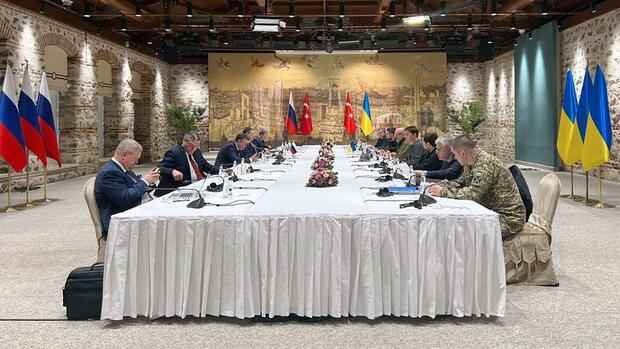Before the start of the new round of negotiations, Turkish President Erdogan appealed to both sides.
(Photo: IMAGO/ITAR-TASS)
Istanbul A good month after the start of the Ukraine war, negotiations between Kyiv and Moscow have brought slight signs of relaxation. As expected, both sides were unable to agree on a ceasefire on Tuesday, but Turkish Foreign Minister Mevlut Cavusoglu spoke of the “most significant progress” made so far in the talks.
Russia announced that it would significantly reduce its “military activities” in Ukraine in the area of the capital Kyiv and the northern Ukrainian city of Chernihiv. Russian Deputy Defense Minister Alexander Fomin said this was to boost mutual trust. A short time later, the Ukrainian general staff reported that it could observe the withdrawal of individual units of the Russian armed forces around Kyiv and Chernihiv.
However, days ago it was said that the Russian armed forces wanted to concentrate on eastern Ukraine. The move could thus be more in line with Russian military strategy than a real concession.
Nevertheless, those involved in the meeting in Istanbul, which was actually scheduled for two days, spoke of a significantly improved negotiating atmosphere.
Top jobs of the day
Find the best jobs now and
be notified by email.
The talks ended early on Tuesday. Hopes for a diplomatic solution to the Russian invasion of Ukraine pushed global stock prices higher. However, Russia experts have already warned against too high hopes of an early end to the war.
Experts skeptical
By concentrating on eastern Ukraine, given the military problems in Ukraine, Russia is creating a retreat from which it can later attack Kyiv again, according to Stefan Meister, the Russia expert at the German Council on Foreign Relations (DGAP). He doubts that the war will end anytime soon. “I wouldn’t trust the Russian side here. In the end, they want to break up Ukraine as a state and bring it under control.”
Head of delegation Vladimir Medinsky (left) and Deputy Defense Minister Alexander Fomin appeared before the press.
(Photo: IMAGO/ITAR-TASS)
US Secretary of State Antony Blinken warned that what Russia says and does often differs. Moscow’s military offensive continues. However, the US would fully support Ukraine if it saw potential for progress. CNA military expert Michael Kofman, who specializes in Russia, tweeted: “I would be surprised if Russia completely withdraws its troops from the north, because that would free up Ukrainian forces that would strengthen the joint forces in Donbass and give Ukraine a significant victory in could bring to this war.”
The Russian negotiating side now wants to discuss the points proposed by Ukraine with Kremlin chief Vladimir Putin. Ukrainian President Volodymyr Zelensky has indicated that his country is ready for neutral status. This would mean no membership in NATO and no stationing of foreign troops.
In return, however, Kyiv demands security guarantees. Then states such as the members of the UN Security Council or countries such as Canada, Turkey, Germany, Italy, Poland or Israel could intervene should Ukraine’s territorial integrity be violated again. Russia must also accept Ukraine’s possible accession to the EU.
The issue of the status of the Donetsk and Luhansk regions should be excluded from any actual peace settlement.
(Photo: AP)
In the Donbass, the disputed region in the east of the country, a compromise is possible, Zelenskiy indicated in an interview before the negotiations. However, his adviser Mykhailo Podoliak said the issue of the status of the Donetsk and Luhansk regions should be dealt with separately from a peace process.
This is unlikely to meet Russian demands. According to Podoljak, the question of the status of Crimea annexed by Russia could be dealt with within 15 years after the end of hostilities. Fomin said practical issues are now being resolved in preparation for Ukraine’s neutrality, non-nuclear status and security guarantees for the country.
The current coverage of the Ukraine war:
The format of the negotiations this time differed from the backroom talks of the previous delegation meetings. The Turkish head of state Recep Tayyip Erdogan had made a conference room in his Istanbul office available.
During the negotiations, Ukrainian diplomats in particular kept the public up to date almost every minute, and the Russian side also communicated more intensively than before. On other levels, however, there was no talk of diplomatic relaxation: the Netherlands and Belgium expelled a total of 38 Russian diplomats whom they accused of espionage.
More: “A new world order is emerging”: Merkel’s economic adviser on the consequences of the Ukraine war
